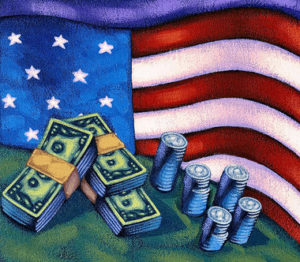If voters owned elections!

There is mounting evidence that many — perhaps even most — Americans think that our democracy is terribly broken. Recent polling data found only 9 percent of Americans reporting that they trusted the government. And the spreading distrust of givernment throughout the country is an even more graphic indication of deep political disaffection. The realization that our political system is controlled by big-money, corporate-based campaign donors resonates widely.
I’ve spent the past few months traveling to college campuses — largely in New York state — to talk with students about these concerns. What they tell me is that they are dismayed by constant tuition increases and the burden of huge student loans, worried that they won’t be able to find jobs when they graduate, and concerned about a range of problems from climate change to racial injustice and growing economic inequality. And they are frustrated that their voices are ignored because of the overwhelming power of wealth in the political system. They are angry that their representatives just aren’t listening to them.
But what if we could change that? What if we could create a practical, constitutional and effective way to make elected officials listen to what the majority of citizens need rather than to what their big campaign contributors want? What if politicians spent time talking with their constituents and trying to solve problems, instead of using precious hours each day raising campaign money from wealthy contributors? And what if highly paid corporate lobbyists had no more access to lawmakers than ordinary citizens who want to have their say?
The fact is that much of this is already within our grasp. By adopting optional public financing of election campaigns — similar to the successful “voter-owned” systems that have been working for decades in New York City, Tuscon, Seattle and other cities as well as states like Connecticut — we can begin to restore the belief in both government and democracy that has been so badly eroded. By giving ordinary citizens the ability to elect representatives who are independent of special-interest money, we can break the stranglehold that big donors now have on our democracy.
When I talk with students about this, they are excited that they might be able to run for office themselves or at least vote for candidates who would be accountable to them. They understand that public campaign financing would open the door to new ideas, new participants, and new hope for a more inclusive democracy.
But they are also skeptical. They ask why politicians would support reforming a system that has put them where they are.
So they are astonished when I tell them that the New York State legislators have finally passed public campaign financing bills that change the way elections are financed . In New York and other public financing states, voters are fed up and angry enough to convince our elected representatives to do what’s right — correct the dysfunctional political system and give us back our democracy. There is a national democracy movement increasingly successful in focusing attention on voting rights and big money in politics. Grassroots organizing is igniting a national movement to restore our trust and belief in government. The majority of Americans want a government that is truly of, by, and for the American people — not one bought and paid for by wealthy donors. We believe in democracy. It’s time for our elected officials to prove that they do, too.
The political power of wealthy special interests produces bad legislation, laws ,and policy outcomes that have hurt ordinary Americans — growing inequality, cuts in education funding and social services, a housing crisis, and corporate profits run amok. But to fix social problems you have to do more than name what’s wrong. You also have to know what you are for!
Public campaign financing will not fix everything wrong with our political system. But with a track record of success in this country, and because it’s a constitutional, cost-effective, pragmatic reform, it’s a great place to start! It can give ordinary citizens the chance to run for office, offer voters more choice by bringing new ideas and people into election campaigns, and enable candidates to spend time talking with their constituents rather than their big donors.
But most importantly, with it we can elect lawmakers who are accountable to us, the people, the voters. Instead of wealthy elites, we can own our elections! Sounds like democracy to me!
Joan D. Mandle is Associate Professor of Sociology, Emerita, Colgate University and Executive Director of Democracy Matters.